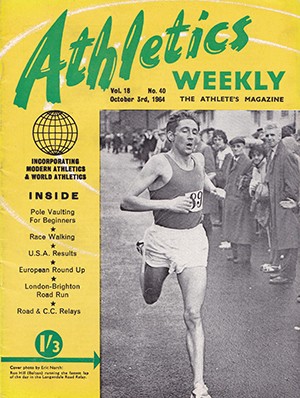The last time the British Olympic marathon trials was held as a standalone race, it was in Milton Keynes in 1980 and won by Ian Thompson.
To read about that race, CLICK here whereas this article below looks at the Olympic trials in the 1960s and 1970s and how they unfolded in the pages of AW.
The aftermath of the 1976 trial at a warm and testing Rotherham course dominated the AW letter pages for weeks. Three strong experienced British marathoners all in their 30s, Barry Watson (2:15:08), Jeff Norman (2:15:17) and Keith Angus (2:15:55), led from better known names Ron Hill (2:16:59) and Bernie Plain (2:18:52) with Ian Thompson fading to seventh in 2:19:07, one place up on 1968 trials winner Tim Johnston.
A total of 46 runners broke 2:30, the last of whom was John Temperton, the chair of English Cross Country Association and domestic competition manager at UK Athletics. When it came to breaking three hours, 178 of the 233 finishers did it.
The selectors chose the top three, which was mostly agreed on, though some wondered about leaving behind a potential champion. However Thompson had done himself no favours by not having shown world class from since winning the European title almost two years earlier.
In the Olympics, the three Britons did not run to the same level as the trials and were led home by Norman in 26th (2:20:04) from Angus 31st (2:22:18) and Watson 45th (2:28:32).
 The 1972 trials were held in Manchester’s Maxol Marathon in May and had 229 runners with 100th place at 2:36:09.
The 1972 trials were held in Manchester’s Maxol Marathon in May and had 229 runners with 100th place at 2:36:09.
German Lutz Philip (it was their trials too) beat the favourite Hill (2:12:51) by a single second. Hill, who in the previous few years had won at Boston and the European and Commonwealth titles and felt he should have been pre-selected and he led home Don MacGregor (2:15:06) and Colin Kirkham (2:15:07) who would join him in Munich.
Don Faircloth (2:15:59) led home the unlucky athletes, though Plain and Wilde had the misfortune of being a minute clear of Kirkham at 30km and fading to seventh and 36th respectively.
Norman and Angus, who would fare better four years later, were 21st and 27th.
In Munich in September Hill would finish sixth in 2:16:30.6, MacGregor seventh in 2:16:34.4 and Kirkham 20th in 2:21:54.8.
The 1968 trials were held in Cwmbran on what now seems a very late date of July 27. Tim Johnston won in 2:15:26 from Commonwealth runner-up Bill Adcocks (2:15:41) and Commonwealth champion Jim Alder (2:16:37).
Despite the quality of that trio it did mean fourth-placer Hill failed to make the team though he showed what might have been with a brilliant seventh (and second European) in the 10,000m in the high altitude at Mexico.
Adcocks, who ran the two fastest times in the world that year – 2:10:47.8 at Fukuoka in December and 2:12:16.8 at Germany in May – was a superb fifth in Mexico in 2:25:33 (again second European) with Johnston eighth (and third European) in 2:28:04, whereas Alder dropped out.
In 1964, there was no one-off trial but Basil Heatley (world record 2:13:55) won the Poly Marathon in June from Ron Hill (2:14:12) with Alder third in 2:17:46 and the top two were selected for Tokyo.

The AAA Marathon was on a ridiculously late August 22 in Coventry and there European and Commonwealth champion Brian Kilby won on a very hot day in 2:23:01 and that gave him the one Olympic spot left open having been at world record pace at well past 15 miles before slowing badly not helped by raw and bleeding feet.
Just 78 started and 34 bettered three hours.
In the Poly, 120 ran with 50th place running 2:38:41.
In the Olympics, Heatley was second (the equal best British result all-time and the best in the last 70 years) in 2:16:20, Kilby fourth in 2:17:03 and Hill 19th in 2:25:35.
» For our feature on the 1980 British Olympic marathon trial in Milton Keynes, CLICK HERE
